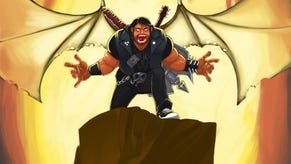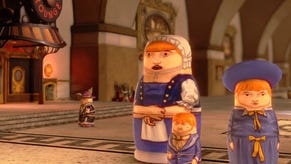Stacking
Welcome to the dollhouse.
If you enjoy Stacking, you probably have amnesia to thank for it. It's a condition games have been exploiting for years, but with Double Fine's latest, the connections are a little more imaginative than usual. In most games, memory loss simply means that your grunty protagonist has woken up in a motel room and forgotten how to double jump. This time, however, the roots lie a lot deeper.
Actually, they lie with something called Amnesia Fortnights, an idea Double Fine boss Tim Schafer came up with to motivate his team during the endless slog of long projects. The concept's simple (and you can try it at home, if you're peculiarly motivated and have access to your own game engine and pipeline): put aside what you're working on right now, split into creative little groups, and spend two weeks building a prototype for a brand new game.
It can be whatever you would like it to be, the odder the better: just clear your mind and make that one thing you most want to make. Oh yes, and try to forget everything you know about how games should work.
Two games in, and it's apparent that most of Double Fine's energy has been spent on forgetting how games should look rather than how they actually play, but it's a process that's still given the team the space to create some distinct and charming experiences. Costume Quest may have been a fairly traditional turn-based RPG when you pulled it apart, but it arrived dressed up as a Charlie Brown holiday special, and wove its sweet adventure around the wonky eaves and sodium glare of an adorable suburban neighbourhood.
Now Stacking offers players a recognisable blend of puzzle and adventure game, but not before pitching them head-first into a world of fretful Russian dolls and 1930s immigrant pluck. Look at a screenshot for this one and you're not going to mistake it for many other games. How often can you say that these days? "Is it Mass Effect which features a bunch of anthropomorphic matryoshkas titting about on a Borrowers-style ocean liner? Or is it Spider-Man: Shattered Dimensions?"
With Stacking, the story and the bizarre, charming visual approach work together, with the former tucked snugly inside the latter. Playing as Charlie Blackmore, the littlest doll in the whole world, you explore a silent-movie landscape of chittering projector screens, filigreed title cards and warm sepia tones. The soundtrack is oozing violin and tinkling piano, while the story is one of poverty, child labour, and gentle rebellion.
Charlie's the runt of the Blackmore clan, which means he's left behind when the larger members of his family are kidnapped by an evil industrialist known as the Baron. It also makes him perfectly suited to rescue them, however, as he can stack himself inside any other dolls he encounters and inherit their special powers. With this simple agenda, the path is set for an adventure built from comic set-pieces and light mischief – and Stacking rarely disappoints.








